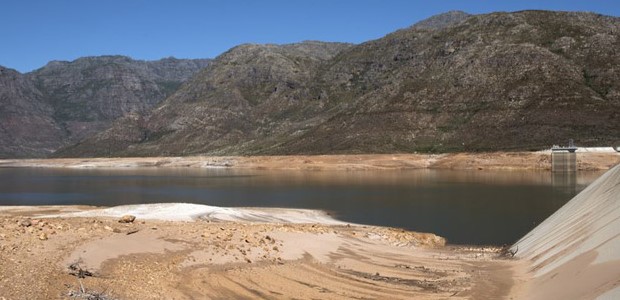
Drought Dominoes: The Psychological Impact of Droughts
We are always going to have droughts. The only way we can address droughts and help prevent this drought domino and effect reduce mental stress is to use water much more efficiently.
- By Klaus Reichardt
- May 30, 2018
Most of us are aware of just how dire the current water situation is in Cape Town, South Africa. Day Zero, when there is no water left for the city's nearly four million people, keeps getting pushed back. But it appears that without a significant rainfall event soon, Day Zero will soon arrive.
What often gets overlooked when a city is in a drought situation such as this, is how it psychologically impacts those living in the city. A drought that has been going on for weeks, months, or years can have a domino effect on people's lives and the ways they interact.
It's like a chain reaction. One event triggers something else to happen, which triggers another thing to happen, and so on. And as this takes place, it can cause real stress, anxiety, misery, even death. Sometimes, it results in people doing things they would never even consider if there were no drought conditions.
For instance, a landlord who owned five apartment buildings in San Francisco would come by every afternoon – on a daily basis - for about ten minutes and hose down the sidewalk in front of his buildings. This uses about 20 gallons of water per minute; 200 gallons per day; 1,400 gallons per week; and more than 7,600 gallons per month, just for one of his five buildings.
Even when severe drought conditions hit the city in 1976, he continued this practice. His tenants would try to convince the him to stop, but to no avail. When one woman pleaded with him, she began to cry.
Finally, the tenants banded together. They would be on watch for him and, as soon as they heard his car pull up, would run down and sit on the sidewalk, often bringing their children and pets with them.
He stopped hosing the sidewalks but blew up at his tenants regularly. He was upset; the tenants were angry, and the neighbors were distressed watching this all unfold. None of this would have happened, nor would any of these people be acting like this, if there was not a drought.
Here are some other dominoes that start falling when severe droughts are called:
- All types of businesses that need water to operate, from car washes, laundries, and restaurants to golf courses, farmers, and industrial sites, may be asked to cut back so severely; it impacts their bottom line. Staff are laid off; some companies go out of business; others move to another state, taking their tax dollars with them; etc. Situations like this cause a lot of anxiety.
- Hot summers get much hotter with no water for relief. Chicago has conducted studies that find the number of homicides and violent crimes all increase when it gets hotter. Social interactions increase in the heat. If there is water, for instance from an open fire hydrant, people in the area can have fun in the heat. But without the water, tensions rise, and these tensions often result in crimes.
- Neighbors start watching each other . . . even more than they usually do. People start watching how others are using their water. If they find they are using it for vegetation or washing cars, which is often banned, invariably problems arise. If authorities are called in, these people are often fined for misusing water during the drought. This causes even more anger among neighbors.
- Facilities start getting smelly, which not only bothers people, but causes a lot of apprehension as well. Right now in Cape Town, they have a program that requires people to only flush toilets after they have been used for peeing four times. Restrooms now have various systems that allow users to mark down when they used the toilet, so others will know when the fourth use has come up. But in the meantime, the restrooms become very foul smelling. As this unpleasantness becomes a daily experience in schools, hospitals, and offices, you can imagine the psychological toll it takes.
- Related to this, droughts can cause serious health issues. Less water is available for home and commercial sanitation. All cleaning solutions and disinfectants are manufactured to be diluted with water. Using cleaning solutions without water results in chemical residue building up on surfaces. This residue attracts more soil and pathogens. Disinfectants will not work correctly without water and will also leave a residue. The result is that surfaces are not properly cleaned and sanitized. In past droughts, the number of cases of diarrhea and other diseases often caused by cross-contamination increased, often the result of inadequate cleaning and sanitation of home and commercial kitchens, restrooms, and eating facilities.
We could go on and on. Droughts can have a severe impact on mental health and cause people to do things they might never even consider. But here's the thing: We are always going to have droughts. The only way we can address droughts and help prevent this drought domino and effect reduce mental stress is to use water much more efficiently. And fortunately, this can be done.
About the Author
A frequent speaker and author on water conservation issues, Klaus Reichardt is founder and CEO of Waterless Co. Inc., based in Vista, Calif. Reichardt founded the company in 1991 with the goal of establishing a new market segment in the plumbing fixture industry with water efficiency in mind. Along with the Waterless No-Flush urinal, which works completely without water, the company manufactures other restroom and plumbing-related products.